Chinese women spend their savings on handbags
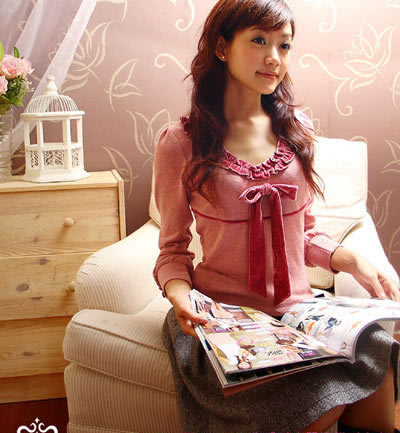
In April 2006, yachts, golf products, watches and other expensive merchandise were added to the luxury consumption tax list in China, which was still far from satisfactory according to some economists. The taxes for luxury products are still relatively low compared to Europe and USA, but the taxes will probably increase in the future. High taxes are for example presently not imposed on private planes, luxury houses or top-grade furniture.
Another interesting phenomenon is that people in Shanghai are more cynical towards brand-names than are people in smaller cities, who are now the true believers. People who spend all the money they got to get LV bags and accessories, and then take those on the buses and subways for them. People who make 3000 RMB a month will spend half a year's savings on a bag. Thriftier types will ask people coming back from Europe or North America to bring back stuff. The explanation given is that although these women might not make a lot of money, they are around people who could spot a fake bag from 50 meters.
As Chinese millionaires spend supporting their fancy lifestyles, the concept of a healthy and sustainable lifestyle, one that stresses the importance of the physical and mental health of all living things, which cannot be achieved by spending a lot of money, is catching on in the US. Will that lifestyle be the new trend and influence the Chinese customers?
Sources: www.shanghaiist.com, www.womenofchina.cn
Project Destination Asia

DestinationAsia is a student driven organization with the purpose to among students increase the knowledge about Asia in general and China in particular. The boardmembers are students from Chalmers and School of Business, Economics and Law in Gothenburg. The goal for the organization is to provide information about how to study and work in the region, but also to create a network between Swedish students/companies and Chinese students/companies.
The organization was established in January 2005 and has sponsors as SAS, Fagerhult, and Hägglunds. Destination Asia has since 2005 arranged different seminars with headlines as ; ‘An introduction to China’, ‘The Chinese economy’ and finally ‘How to work and study in China’.
Finally in order to gain more knowledge about China and to create a functioning network, the present board also went to on a study tour to China for eleven days in early June 2006. During the trip DestinationAsia met several Swedish and foreign companies as well as other experts. After the study tour the board members published an report "China Dawn" about their journey and China experiences.
Source/Photos: Destinationasia.se
The art of gift giving in business

Some general recommendations before you hand over your gifts to your Chinese business partners...
- All business negotiations should be concluded before gifts are exchanged.
- Specify that the gift is from the company you represent. If you can, explain the meaning of the gift to the receiver.
- Present the gift to the leader of the Chinese negotiating team.
- Do not get anything that is obviously expensive, so that the company will not feel obliged to reciprocate.
- Valuable gifts should be given to an individual only in private and strictly as a gesture of friendship.
- Make sure that the gifts given to people of the same level of importance are equitable or of similar grade.
- Do not wrap a gift before arriving in China, as it may be unwrapped in Customs.
- If possible, have your gifts wrapped in red paper, which is considered a lucky color. Plain red paper is one of the safe choices since a variety of meanings, many of which are negative, are attributed to colors in Chinese culture.
- Pink and gold and silver are also acceptable colors for gift wrap. Wrapping in yellow paper with black writing is a gift given only to the dead. Also, do check the variations from region to region about colors.
Source:chinese-school.netfirms.com
Photo:www.worldmarket.com
Foreign banks in China are doing well
The total assets of foreign banks in Shanghai, have risen to 60 billion U.S. dollars "The total assets of foreign banks in Shanghai have grown by 31 percent annually over the past five years" said Fang Haixing, deputy director of the Shanghai Municipal Office of Finance Service. They now total more than 60 billion U.S. dollars, making up 14.2 percent of the Shanghai banking sector, up from 13.1 percent in 2005.
Foreign banks had set up 94 business branches in Shanghai by the end of last October, almost double the number five years ago, the official said. Fang expected the total assets of foreign banks to account for 20-30 percent of Shanghai's banking sector in the future.
Foreign insurance companies also did well last year, garnering 7.03 billion yuan in insurance premiums in the January to November period between them, up 34.8 percent year-on-year.
Source:crienglish.comGoogle/Foreign Banks in China
IKEA's adaptations to the Chinese market
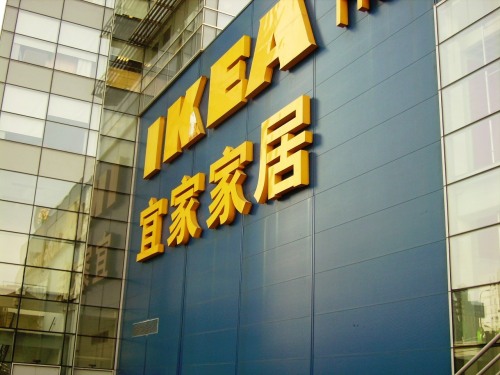
Have written a short report from my visit at the IKEA store in Shanghai. This picture is taken outside the IKEA store in Shanghai.
The Chinese translation of IKEA pronounces "Yijia", which literally means "suits home." IKEA has a 4 prong strategy for China: setting up commercial offices, opening stores, establishing procurement centres and investing in setting up factories. It is reported that IKEA has invested US$60 million to build Asia's biggest furniture market in Shanghai (area 36,000 square meters). The company president is on record as saying the company also plans to set up 2 new stores every year in China. The coastal cities and developed inland cities will be its main focus. Currently the company's commercial office in Chengdu City, Sichuan Province plans to procure furniture valued at 4 million every year.
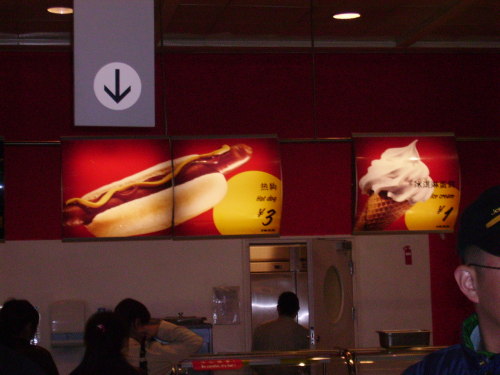
Cheap hot dogs and ice cream are tempting the customers even in China after a long shopping day.
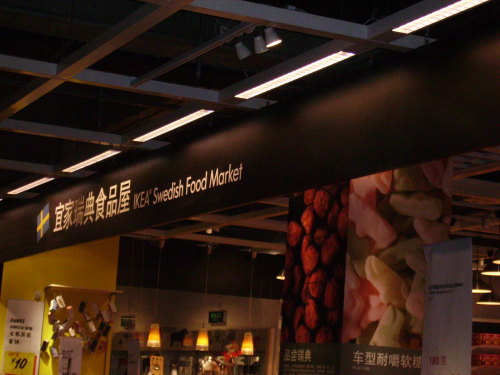
The Swedish food market cures homesick Swedes. Special Swedish products like herring, salt liquorice, and ginger breads are sold.
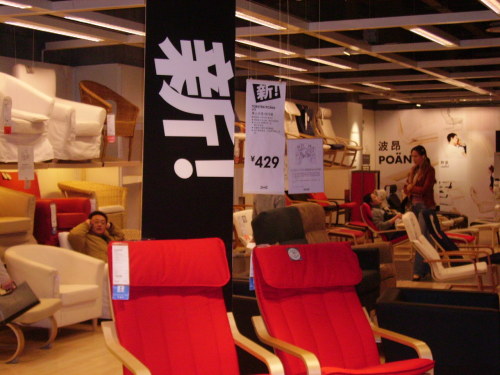
The products IKEA are selling are the same worldwide. In China some service adaptions have been done. One difference is that in the Chinese stores you can find a detailed map of the store showing where you are for the moment and the best way to walk around in the store. Another additional service is that you can borrow a bike to transport the products and if you pay extra money you will get help from one IKEA staff member putting the furniture together at your place.
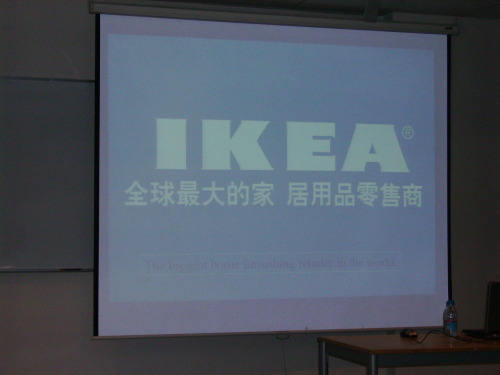
The original brand
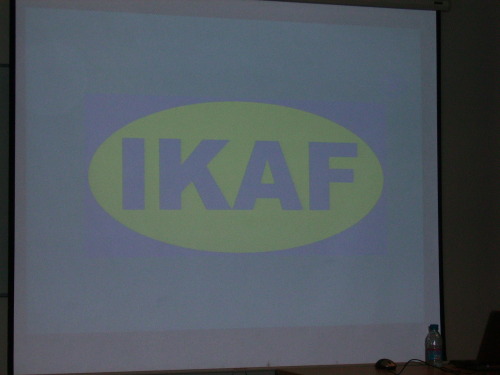
An IKEA copy. When IKEA entered the Chinese market they experienced problems with the pricing. The prices were to high and IKEA was in the beginning considered to be an exclusive brand. Some local companies started to produce cheaper copies of the IKEA furniture. The models were copied directly from the IKEA catalog.
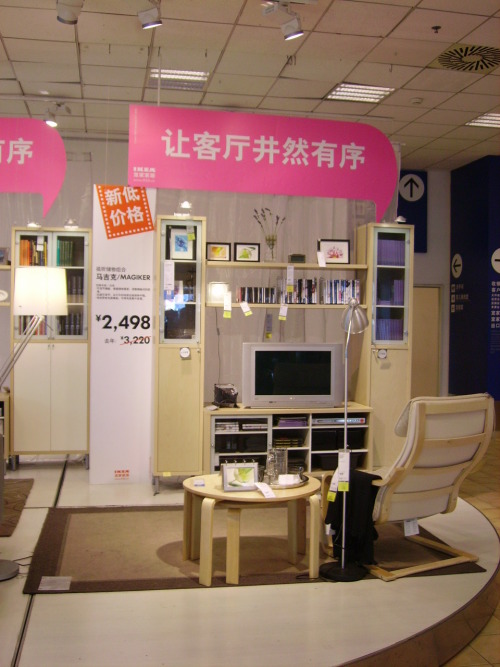
An IKEA furnished room, could be in New York, Amsterdam, Tokyo or anywhere in the world, the concept is the same. The Chinese IKEA customers are known for really trying the products. In the Shanghai store you can find people sleeping in the beds and bringing their laptops to work in the prototype office.

IKEA's most famous product worldwide; The bookshelf Billy
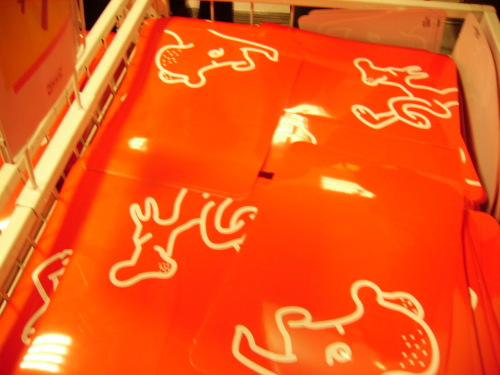
Kitchen accessories in a special " Year of the dog collection" (in 2006)
Photos:chinamarket.se
Sources: IKEA.com, www.echeat.com